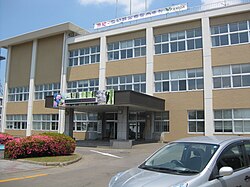Kitaakita, Akita
|
Kitaakita 北秋田市 |
|||
|---|---|---|---|
| City | |||

Kitaakita City Hall
|
|||
|
|||
 Location of Kitaakita in Akita Prefecture |
|||
| Coordinates: 40°13′33.7″N 140°22′14.9″E / 40.226028°N 140.370806°ECoordinates: 40°13′33.7″N 140°22′14.9″E / 40.226028°N 140.370806°E | |||
| Country | Japan | ||
| Region | Tōhoku | ||
| Prefecture | Akita Prefecture | ||
| Area | |||
| • Total | 1,152.76 km2 (445.08 sq mi) | ||
| Population (September 2015) | |||
| • Total | 33,064 | ||
| • Density | 28.7/km2 (74/sq mi) | ||
| Time zone | Japan Standard Time (UTC+9) | ||
| City symbols | |||
| • Tree | Beech | ||
| • Flower | Hydrangea | ||
| • Bird | Black woodpecker | ||
| Phone number | 0186-62-1111 | ||
| Address | Hanazono-chō 19-1, Kitaakita-shi, Akita-ken 018-3392 | ||
| Website | Official website | ||
Kitaakita (北秋田市 Kitaakita-shi?) is a city located in Akita Prefecture, in the Tohoku region of northern Japan.
As of September 2015, the city had an estimated population of 33,054 and a population density of 28.7 persons per km2. The total area was 1,152.76 square kilometres (445.08 sq mi).
Kitaakita is located in the mountains of northeastern Akita Prefecture, with the Ou Mountains on the east. Part of the city is within the borders of the Towada-Hachimantai National Park. Much of the city area is covered in forest. Due to its inland location, the city is noted for its heavy snowfall in winter.
Kitaakita has a humid continental climate (Köppen climate classification Dfa) with large seasonal temperature differences, with warm to hot (and often humid) summers and cold (sometimes severely cold) winters. Precipitation is significant throughout the year, but is heaviest from August to October.
The area of present-day Kitaakita was part of ancient Dewa Province. During the Edo period, the area came under the control of the Satake clan, who ruled the northern third of the province from Kubota Domain. After the start of the Meiji period, the area became part of Kitaakita District, Akita Prefecture in 1878.
...
Wikipedia



